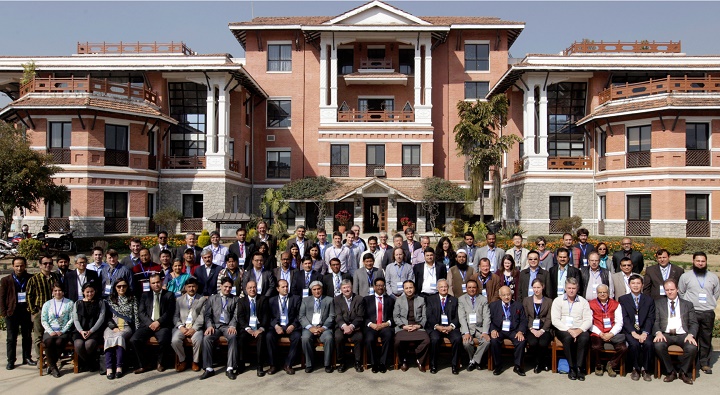Experts at an international conference call for better coordination and cooperation between scientists, government authorities, and development partners to address emerging challenges in the Indus River basin
KATHMANDU (Nepal) – Greater collaboration is needed between various stakeholders to understand and mitigate the impacts of climate change in the Indus Basin which is the most glacier and snowmelt-dependent basin in the Greater Himalaya region, experts urged at a conference held in Nepal.
“The seasonal shift in snowfall to late spring and the subsequent heat waves lasting two to three days have caused rapid melting of snow, flash floods, early avalanches, and loss of life and property”, said Hafiz Hafeez ur Rehman, Chief Minister of Gilgit-Baltistan, Pakistan, during the inauguration of the international conference on Climate and Environmental Change Impacts on the Indus Basin Waters.
The conference was organized by International Centre for Integrated Mountain Development (ICIMOD), World Bank, and International Water Management Institute (IWMI) to enhance cooperation on the development of knowledge to help shape policies in the Indus River basin.
“The Indus River supports a population of about 215 million inhabitants of Afghanistan, China, India and Pakistan, whose livelihoods depend on these waters”, said Eklabya Sharma, Director of Programme Operations at ICIMOD, emphasizing the importance of research on the impacts of climate change in the Indus basin.
“While reducing knowledge gaps is important, it is equally important that people and communities benefit from the knowledge we generate,” he added. Dr Sharma also stressed the need for transboundary cooperation among the four countries to support the sustainable development and management of Indus waters.
“The Indus Basin is the most glacier and snowmelt-dependent basin in the Greater Himalaya region. Climate change and resulting changes in seasonal runoff patterns pose significant challenges to livelihoods and socio-economic development, and it is the poor who are the most vulnerable”, said Christina Leb, Senior Water Resources Specialist at the World Bank, emphasizing that adaptation strategies and policies need to be informed by science.
Alan Nicol from the International Water Management Institute stated that the “level of challenges facing the Indus Basin call for collective action across the basin”. He further emphasized the challenge of population growth, calling for “greater attention to the future employment needs of the growing economically active population”.
During the conference, scientists shared results from past and ongoing research, while practitioners presented the progress of ongoing initiatives in the basin. The topics of discussion were diverse and included climate change and variability, cryosphere dynamics, data collection and sharing, water availability and demand, climate-induced hazards and risks, and local and basin-level adaptation strategies.
“Greater coordination among researchers and the use of common methods and standards for data collection could enhance our understanding of the changing cryosphere and hydrological regimes in the Indus basin”, said Arun Bhakta Shrestha from ICIMOD. A post-conference workshop was held on 19 February to discuss ways to bridge these gaps and create positive outcomes for greater cooperation.
Greater collaboration is needed between various actors and initiatives working to understand and mitigate the impacts of climate change in the basin. While there are data and research gaps, the situation is exacerbated by the lack of adequate sharing among researchers, between researchers and government and among the latter, an area that participants emphasized should be a priority.
Through group discussions and plenary sessions, participants attempted to find solutions for challenging areas such as coordinating research and mutual stakeholder interaction across the four countries of the Indus basin and integrating research on the upper Indus basin with those on the lower part of the basin, and with policy and decision making. Participants agreed that coordination and cooperation would be facilitated through two coordinating bodies already working in the basin: the Upper Indus Basin Network, which will focus on reducing knowledge gaps, and the Indus Forum, which will facilitate the coordination among various stakeholders, including policy makers.
The conference, held from 16 to 19 February, brought together more than 80 researchers, policy makers, journalists, and practitioners from the four countries sharing the Indus basin, as well as international experts and representatives of development partners.


